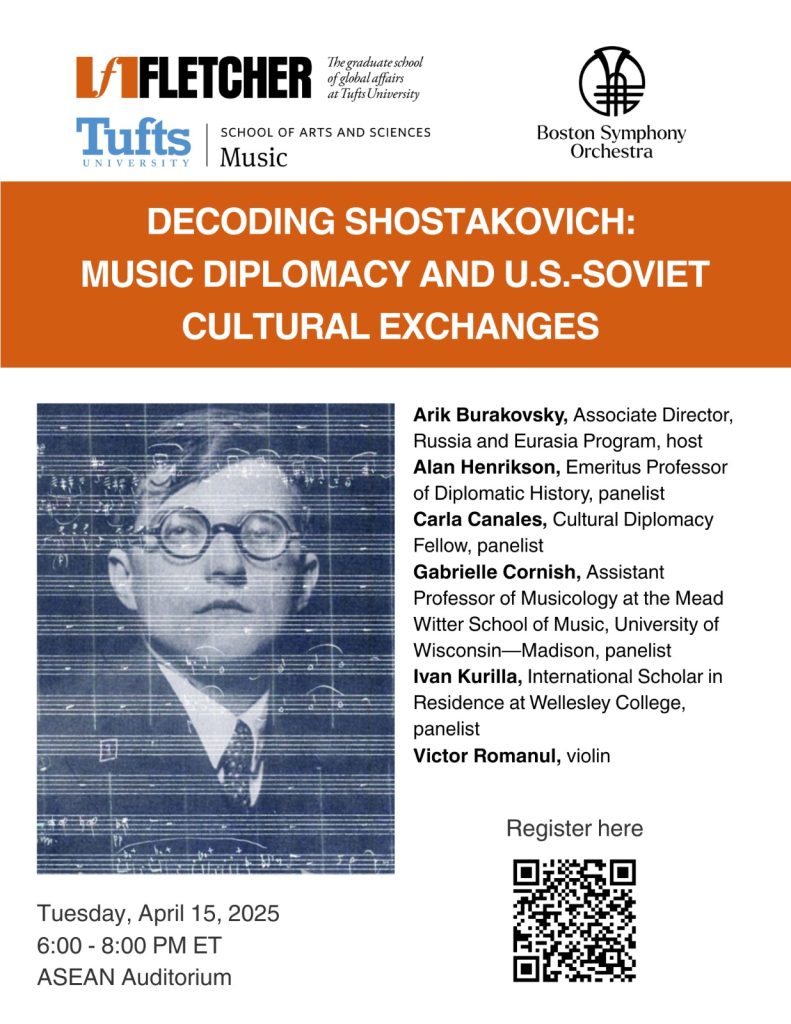
- This event has passed.
Decoding Shostakovich: Music Diplomacy and U.S.-Soviet Cultural Exchanges
April 15, 2025 @ 6:00 pm – 8:00 pm
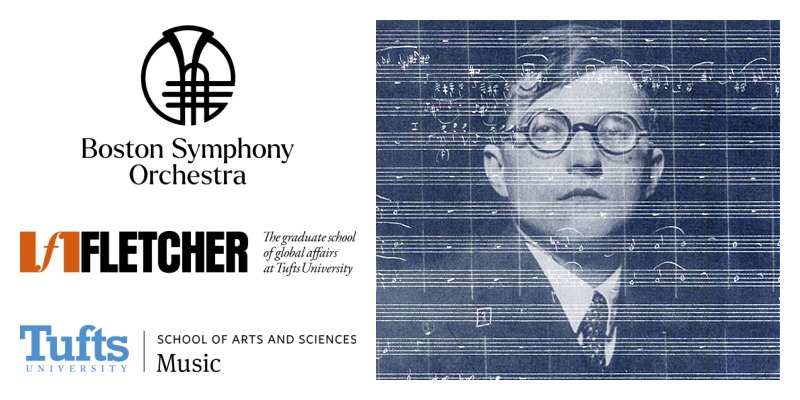
Please join the Russia and Eurasia Program at The Fletcher School of Law and Diplomacy, the Department of Music at Tufts University, and the Boston Symphony Orchestra for a solo violin performance and a panel discussion exploring the role of music in cultural diplomacy, focusing on Dmitri Shostakovich and U.S.-Soviet cultural exchanges.
As a composer deeply entangled in the political and artistic currents of his time, Shostakovich was a towering cultural figure of the Cold War era. His works were alternately celebrated, scrutinized, and politicized by both Soviet and Western audiences. The panelists will examine the historical and political dimensions of U.S.-Russia musical connections, the broader significance of cultural diplomacy, and the ways in which Shostakovich’s life and music reflected and influenced Cold War tensions, offering insights into the enduring power of culture in international relations.
Arik Burakovsky, Associate Director, Russia and Eurasia Program, host
Alan Henrikson, Emeritus Professor of Diplomatic History, panelist
Carla Canales, Cultural Diplomacy Fellow, panelist
Gabrielle Cornish, Assistant Professor of Musicology at the Mead Witter School of Music, University of Wisconsin—Madison, panelist
Ivan Kurilla, International Scholar in Residence at Wellesley College, panelist
Victor Romanul, violin
SHOSTAKOVICH Romance from The Gadfly, Op. 97a
Selections from SHOSTAKOVICH Five Pieces (arr: L. Atovmian for solo violin)
I. Prelude
II. Gavotte
IV. Waltz
The event is open to the public. Please register via the Boston Symphony Orchestra website here to attend the event in person. Please contact us with any questions you might have about the event, if you would like to submit discussion questions for the speaker in advance, or if you would like to attend virtually. Refreshments will be served following the event. Please let us know if you have any dietary restrictions, and we will do our best to accommodate you.
Visitors to the Medford/Somerville campus are welcome to park in the Dowling Garage or Cousens Parking Lot. Visitors may pay for their parking sessions via the web portal or payment kiosks. Please contact us with any questions you might have about the event.
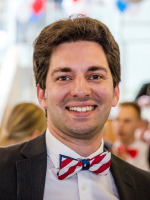 | Arik Burakovsky is Associate Director of the Russia and Eurasia Program and the Hitachi Center for Technology and International Affairs at The Fletcher School. His research interests include Russian foreign policy and political economy, soft power, public diplomacy, and international relations forecasting. Before completing his M.A. in Law and Diplomacy at The Fletcher School, Arik interned in the Public Affairs Section at the U.S. Embassy Moscow and studied the Polish language and culture as a Boren Fellow at the University of Warsaw in Poland. He also served as a Fulbright English Teaching Assistant in Omsk, Russia and twice as Resident Director of the ROTC Project GO intensive summer Russian language program in Narva, Estonia. His work has been published by The Conversation, TIME, The National Interest, the Chicago Council on Global Affairs, and elsewhere. Arik received his B.A. in Political Science and International Relations from the University of California, San Diego. |
 | Carla Dirlikov Canales is an internationally acclaimed opera singer, cultural diplomat, and senior government official. Praised by Opera Magazine for a voice that “grabs the heartstrings with its dramatic force and musicality,” she has performed leading roles worldwide, including over 80 performances as Carmen in 12 countries. She has appeared as a soloist at Carnegie Hall, Lincoln Center, and the Kennedy Center and collaborated extensively with major symphony orchestras in China. In 2023, Carla joined the Biden Administration as Senior Advisor and Envoy for Cultural Exchange at the President’s Committee on the Arts and the Humanities (PCAH), where she launched Artists for Understanding to promote the arts as a tool for global dialogue. She has served as an Arts Envoy for the U.S. State Department for two decades, leading international cultural diplomacy projects, including a 2024 initiative with the U.S. Embassy in China. Carla teaches at the Kennedy School of Government at Harvard University and has held faculty roles at The Fletcher School and the University of Denver. She founded The Canales Project, which created Hear Her Song, a musical tribute to female leaders, honoring figures like Hillary Clinton and Malala Yousafzai. A multilingual advocate, she has received numerous awards, including Foreign Policy’s 100 Leading Global Thinkers. |
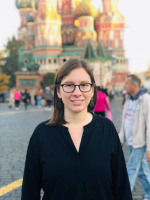 | Gabrielle Cornish is an Assistant Professor of Musicology at the Mead Witter School of Music, specializing in music and everyday life in the Soviet Union. Her monograph-in-progress, Socialist Noise: Sound and Soviet Identity after Stalin, explores the intersections of music, technology, and Cold War politics. Her research has been supported by Fulbright, Title VIII, and the Cohen-Tucker Dissertation Research Fellowship. She earned her Ph.D. in Musicology from the Eastman School of Music in 2020, where she was awarded a Mellon/ACLS Dissertation Completion Fellowship and an Alvin H. Johnson AMS-50 Fellowship. She also received the Paul A. Pisk Prize for outstanding graduate student research. Cornish is a network leader in the Music Studies and the Anthropocene Research Network and is working on a project examining the Geiger Counter as an acoustic medium in relation to Chernobyl. Her work has appeared in the Journal of Musicology, The New York Times, Slate, and The Washington Post. She has also discussed Russian history and culture on NBC, BBC World Service, and BBC Radio. |
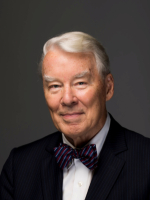 | Alan Henrikson is Lee E. Dirks Professor of Diplomatic History Emeritus and the founding Director of Diplomatic Studies at The Fletcher School, where he has taught American diplomatic history, contemporary U.S.-European relations, and the history, theory, and practice of diplomacy. He has served as a Fulbright Professor at the Diplomatische Akademie in Vienna and at the College of Europe in Bruges. He has also taught at the Foreign Affairs University in Beijing and other institutions worldwide. In April 2018, he was a visiting professor at the Moscow State Institute of International Relations (MGIMO University), where he gave a course on “Diplomacy” in the master’s degree program on Governance and Global Affairs and an invited classroom lecture on “Diplomacy and Friendship.” Having lived through and taught the history of U.S.-Soviet relations throughout the Cold War and its aftermath, he is mindful of the bonds, including cultural exchanges, that have helped to maintain what has been called the “Long Peace.” |
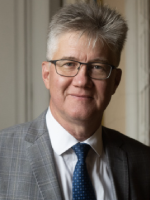 | Ivan Kurilla currently teaches at Wellesley College as an International Scholar in Residence and was previously a visiting scholar at The Fletcher School. Before being forced to leave Russia in 2024, Kurilla taught at European University at St. Petersburg and Volgograd State University. He also taught at Bowdoin College (as a Tallman Visiting Professor) and Wellesley College (as a Mary L. Cornille Distinguished Visiting Professor), and he conducted research at Dartmouth College (as a Fulbright scholar) and George Washington University. His research focuses on U.S.-Russian relations, particularly during the American antebellum and Civil War periods, as well as the role of historical memory and politics in Russia and the post-Soviet space. Kurilla graduated from Volgograd State University in 1991 and earned his Candidate of Sciences (1996) and Doctor of Sciences (2005) degrees in American history from the Institute of World History of the Russian Academy of Sciences. He has written and edited multiple books in English and Russian, including Trailing the Bolsheviki: Twelve Thousand Miles with the Allies in Siberia (Slavica, 2020) and Russian/Soviet Studies in the United States, Amerikanistika in Russia: Mutual Representations in Academic Projects (Lexington, 2016). A book on the history of Russia-U.S. relations coauthored with David S. Foglesong (Rutgers) and Victoria I. Zhuravleva (RSUH) is under review by a major publisher. |
 | Victor Romanul was a member of the Boston Symphony Orchestra violin section from 1992 to 2025. He performed as soloist 16 times with the BSO and Boston Pops, performing concertos by Korngold, Beethoven, and Bruch, and music of Sarasate. His debut performance with the BSO was at the age of 13 as a BSO youth concerts competition winner under Harry Ellis Dickson, and at 15 he performed Sarasate’s Zigeunerweisen and Navarra with the Boston Pops and Arthur Fiedler. As a Fellow of the Tanglewood Music Center, Romanul won the Pierre Mayer award for Outstanding String Player. After studying with Jascha Heifetz, he joined the Pittsburgh Symphony at age 21 and was promoted a week later to Associate Concertmaster, a position that he held for six years, performing the Beethoven concerto with Myung-whun Chung and the Dvořák concerto with Zdeněk Mácal. With André Previn, Romanul recorded a national TV program for PBS, viewable on YouTube. After leaving Pittsburgh to tour as a soloist for several years, he joined the Boston Symphony in 1992, serving as Assistant Concertmaster 1993-1995. The BSO has streamed many of Romanul’s performances of solo repertoire by Paganini, Sauret, and Bach, and William Grant Still’s Suite for Violin and Piano recorded from the Symphony Hall stage. Romanul’s first violin teacher was former BSO Associate Concertmaster Alfred Krips. He also worked with Ivan Galamian and Joseph Silverstein. Romanul’s repertoire has included concertos by Glazunov, Bach, Brahms, Paganini, Chausson, Mendelssohn, Mozart, Tchaikovsky, Sibelius, Vivaldi, José White Lafitte, and many others. In recital, Romanul has frequently performed the 24 Paganini caprices, the six Ysaÿe sonatas, and the Bach solo sonatas and partitas. He performed the complete 10 Beethoven sonatas over three concerts at the Goethe-Institut in Boston. In 2016, he wrote an article for Strings Magazine about his career, and in 2019, Mel Magazine featured him as one of 10 performers from around the world whose performances could make one like classical music. |
